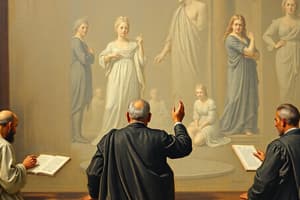Podcast
Questions and Answers
What was Mercy Lewis concerned about when she said, 'In my house!? In my house, Thomas?'
What was Mercy Lewis concerned about when she said, 'In my house!? In my house, Thomas?'
- They will topple me with this. (correct)
- I just thought to see how Betty is.
- Why aren't you home?
- It's weirdish, I know not.
Who is with Ruth?
Who is with Ruth?
Her grandma
Mercy Lewis believes that a sneeze is a sign of life.
Mercy Lewis believes that a sneeze is a sign of life.
True (A)
How does Mercy respond to the question about going home?
How does Mercy respond to the question about going home?
What has been happening to Ruth according to Mercy?
What has been happening to Ruth according to Mercy?
What does Mercy suggest to wake Betty?
What does Mercy suggest to wake Betty?
What concern does Mercy express about being questioned?
What concern does Mercy express about being questioned?
Mercy Lewis believes they cannot be caught because they did not engage in witchcraft.
Mercy Lewis believes they cannot be caught because they did not engage in witchcraft.
What rumors does Mercy Lewis mention regarding their reputation?
What rumors does Mercy Lewis mention regarding their reputation?
What does Mary Warren claim about her actions?
What does Mary Warren claim about her actions?
What does Mercy say about Proctor's wife?
What does Mercy say about Proctor's wife?
What does Mercy imply when she says, 'I freeze'?
What does Mercy imply when she says, 'I freeze'?
Mercy believes that touching a cold body is a solution.
Mercy believes that touching a cold body is a solution.
What does Mercy mean by 'It's on the beam!'?
What does Mercy mean by 'It's on the beam!'?
Flashcards are hidden until you start studying
Study Notes
Key Characters and Dialogue Context
- Mercy Lewis: A prominent character involved in the unfolding witch trials, showcasing a mix of concern and fear throughout her dialogues.
- Thomas Putnam: Mentioned in relation to house concerns, indicating the social and public stakes involved in the witchcraft accusations.
Discussion of Ruth's Condition
- Ruth's Illness: Described as "weirdish," implying mysterious afflictions possibly linked to supernatural causes, aligning with the collective hysteria.
- Mercy's Response: Suggests that Ruth's condition may reflect a state akin to death, conveying a dire atmosphere of fear within the community.
Reactions to Betty's State
- Betty's Coma-like State: Characters express frustration over her silence, highlighting the intensity of their predicament and the prevailing panic surrounding teenage behavior linked to witchcraft.
- Use of Physical Measures: Suggests a desperate approach to communicate, with characters attempting to "beat" the state out of Betty, illustrating desperation in crisis management.
Escalating Tensions in Salem
- Confession of Dancing: Characters are urged to admit to dancing to keep the focus on their own innocence, signifying the extent to which they are willing to navigate the deceptive environment.
- Fear of Exposure: Expressions of concern about being found out signify the ever-present dread of societal judgment and the repercussions linked to witchcraft accusations.
The Widespread Panic
- Community Alarm: The character’s awareness of the townsfolk discussing witchcraft sets the stage for group paranoia and collective actions against perceived threats.
- Dramatic Irony: The line about being called witches indicates a foreboding and anticipatory fear that pervades the characters’ interactions.
Individual Rationalizations
- Denial of Actions: Characters express innocence, reaffirming a defensive posture against accusations, highlighting the conflict between personal integrity and public suspicion.
- Character Dynamics: Exchanges show power dynamics, particularly between Abigail and Mary Warren, with implications of social standing and influence in a witch-hunt culture.
Overall Themes
- Fear and Hysteria: The dialogue encapsulates themes of social anxiety, highlighting how fear can manipulate and alter community behaviors and relationships.
- Supernatural Beliefs: Characters’ attitudes reflect widespread belief in witchcraft and the supernatural, significantly influencing their actions and the unfolding events within Salem.
Studying That Suits You
Use AI to generate personalized quizzes and flashcards to suit your learning preferences.



